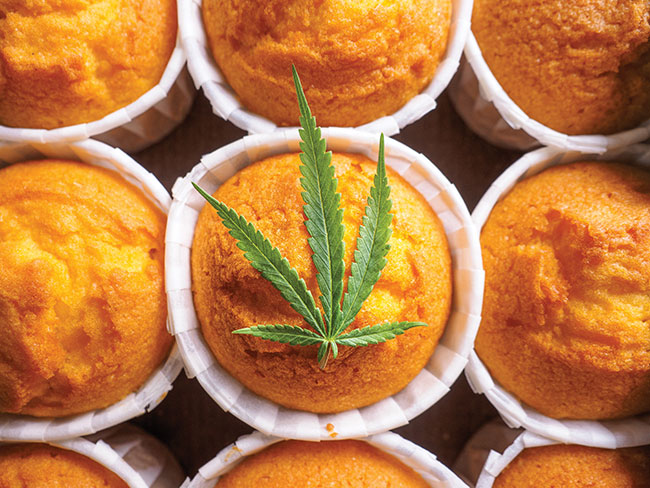
Final Proof: Cannabis 2.0
February 20, 2020
By Jane Dummer, RD
Challenges and opportunities: what is the 2020 outlook for edibles?
 © Evgeniy / adobe stock
© Evgeniy / adobe stock In Canada, regulations governing cannabis edibles came into force on October 17, 2019, one year after the legalization of recreational marijuana. The journey to the retail shelf has been slower than anticipated for authorized cannabis edibles. Even though the regulations were announced in October, manufacturers had to submit their product and package details to Health Canada for final approval over a 60-day period. Therefore, by mid-December legal edibles could have been on shelves across Canada. The industry is expecting edible products will attract customers who are unwilling to smoke cannabis or try vape products with cannabinoids.
Sylvain Charlebois, Scientific Director, Agri-food Analytics Lab, Dalhousie University identifies, “There are numerous challenges that face companies and new cannabis products, not the least of which is consumer education and a strict regulatory regime that limits cannabinoid content, promotion, and manufacturing. We believe strict regulations are delaying that process more than expected for legal edibles. In most provinces, delays have been reported. Our biggest concern has always been about the black market. If legal products are not available, or too expensive, the black market will certainly find a way to provide the illicit product the consumer will be looking for, including edibles.”
Along with regulatory hurdles, consumer education is another important piece for these new products. From the 2019 survey research lead by Charlebois at Dalhousie University, it was concluded more (an increase of 13 per cent from 2017 research) Canadians see cannabis, specifically CBD as a healthy ingredient. However, 60 per cent of the 1051 sample size surveyed are still concerned they may eat too much cannabis-infused food and worry that the effects would be too strong. From my research, there seems to be some general confusion around CBD edible products and THC edible products.
Janice Newell Bissex, MS, RDN, FAND, Holistic Cannabis Practitioner and Culinary Nutritionist explains, “Of course, the big difference is that a CBD edible will not have psychotropic effects. It will not make you ‘high’ like THC edibles. Most of my clients prefer a CBD edible since they use CBD for anxiety, pain, insomnia, and other conditions. If someone is only looking for the high, they can choose a THC edible. Start low and go slow is my advice. It’s important to remember that an edible can take up to 2 hours to take effect and if you over consume it will not be enjoyable. With edibles, THC tolerance is top of mind for consumers across Canada and USA. Newell Bissex, recommends for a first-time edible user to start at 2.5 to 5mg THC. 10mg is fine for a more experienced user but not for a novice. An edible with a blend of CBD and THC can be a good option for many because the CBD in the product can tamp down on the psycho-activity of the THC, allowing people to get a large enough dose to find relief and get the medical benefits of both cannabinoids without getting too high.”
Charlebois noted, “With edibles, what is called ‘onset time’ is a critical factor in the next stage of cannabis-infused beverages and food. There are new commercial technologies available that allow food and beverage processors to reduce onset time for edibles and cannabis-infused beverages. For example, someone drinking a non-alcoholic, cannabis-infused beverage could feel the effects in 10 minutes instead of an hour, and those effects could wear off in about 90 minutes. This would make edibles more predictable in their effects and the market more attractive to consumers and the food/beverage industry.”
Formulating beyond gummies and sweet treats is something Newell Bissex is hoping to see more of from the edible industry. As a science-based nutritionist, she wants the availability edibles with nutrient dense ingredients including seeds, nuts, dried fruit and honey for both medical and recreational use. Also, Newell Bissex stated that cannabinoid absorption is enhanced when combined with a fat source. It’s best to create an edible with healthy fats like the ones in nuts, seeds, and plant-based oils.
Within the current regulatory framework, I believe 2020 will be a year of overcoming the challenges and embracing the opportunities for companies in the cannabis edible space to properly grow the legal market across Canada.
Jane Dummer, RD, known as the Pod to Plate Food Consultant, collaborates and partners with the food and nutrition industry across North America. www.janedummer.com
Print this page
Leave a Reply